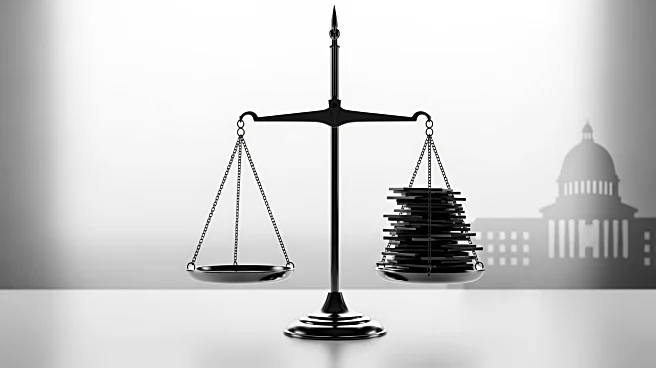What's Happening?
The Trump administration has informed Congress that it currently lacks the legal justification to conduct military strikes inside Venezuela. During a classified briefing, Secretary of State Marco Rubio,
Defense Secretary Pete Hegseth, and a White House legal official explained that the existing legal opinion from the Justice Department's Office of Legal Counsel does not permit strikes against land targets in Venezuela. The briefing clarified that while the U.S. military campaign against suspected drug boats in the Caribbean is ongoing, it does not extend to land targets. The administration is seeking a separate legal opinion to potentially justify future strikes without needing congressional authorization. The buildup of military assets in the Caribbean, including the Ford Carrier Strike Group, is intended to support counternarcotic operations and intelligence gathering, not direct strikes inside Venezuela.
Why It's Important?
This development is significant as it highlights the legal and political complexities involved in U.S. military operations in Latin America. The Trump administration's approach to handling narcoterrorism and drug trafficking has raised questions about the balance of power between the executive branch and Congress. The lack of legal justification for strikes in Venezuela underscores the challenges in expanding military operations without congressional approval. This situation could impact U.S. foreign policy and its relations with Latin American countries, as well as domestic debates over the scope of presidential military authority. Stakeholders such as lawmakers, defense officials, and international partners are closely monitoring the administration's next steps.
What's Next?
The Trump administration is considering obtaining a new legal opinion from the Justice Department to justify potential future strikes against land targets in Venezuela. This move would allow the administration to bypass Congress in authorizing military force. However, no decisions have been made yet, and the situation remains fluid. The administration's actions will likely continue to be scrutinized by Congress, particularly regarding the legality and necessity of using lethal force against suspected drug traffickers. The ongoing military presence in the Caribbean will support intelligence operations and counternarcotic efforts, but any escalation could prompt further political and diplomatic consequences.
Beyond the Headlines
The ethical and legal dimensions of using military force without congressional approval are significant. The administration's strategy raises questions about the transparency and accountability of military operations targeting drug trafficking. The reliance on intelligence to justify strikes, without public disclosure of evidence, may lead to debates over civil liberties and the rule of law. Additionally, the potential for increased military involvement in Latin America could affect regional stability and U.S. diplomatic relations.









